What Should You Know Before Buying a Laptop?
Whether you are looking to buy a laptop to work from home, attend online classes, or game, finding a suitable laptop can be complicated, which is why we provide this guide to help you choose the best laptop for you.
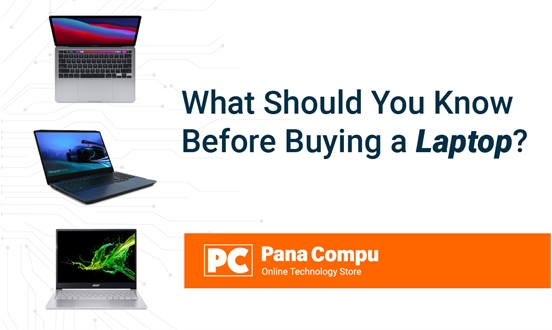
Buying a laptop can be an overwhelming decision with so many options available in the market. From ultralight models to powerful gaming laptops, each is designed to meet different needs. Knowing what to look for before making a purchase is crucial to ensure that the laptop you choose fits your requirements and offers the best possible performance.
What are the key factors to consider before buying a laptop?
Buying a laptop is a significant investment. It's not just about the technical specifications, but also about how it fits into your lifestyle and needs. The best laptop is the one that meets your specific requirements without exceeding your budget, which is why we have compiled this list of key factors to consider before buying a laptop:
What will be the primary use of the laptop?
One of the first steps in choosing a laptop is to ask yourself what you will use it for. The primary use will largely define the type of device you need. Here are some recommendations based on different uses:
- Are you looking for a Laptop for students?: For basic tasks like writing documents, making presentations, browsing the internet, and making video calls, an affordable laptop with a basic processor and 8 GB of RAM will be sufficient.
- Are you looking for a Laptop for work?: If your job involves using multiple applications, such as video editing or programming software, you will need a powerful processor, such as an Intel Core i5 / AMD Ryzen 5 or higher, and at least 16 GB of RAM.
- Are you looking for a Laptop for gaming?: Gamers need a laptop with a high-end processor (Intel Core i7 or Ryzen 7), a dedicated graphics card (NVIDIA GTX or RTX), and a screen with a high refresh rate.
- Are you looking for a Laptop for graphic design or video editing?: If you work with graphic or video editing software like Adobe Premiere or Photoshop, it's wise to get a laptop with a powerful processor, 16 GB of RAM or more, and a dedicated graphics card.
What is your available budget?
Laptops vary greatly in price, from affordable options costing a few hundred dollars to high-end models that can cost over a thousand or two thousand dollars. Determine your budget before you start looking, and remember that investing in a quality laptop can be a more cost-effective decision in the long run. We can divide this into 3 categories of laptops:
- Budget laptops: Models like Chromebooks are ideal for basic tasks and are priced accessibly. These usually cost around 500 dollars.
- Mid-range laptops: Here you will find balanced options between price and performance, ideal for office work or studies. These laptops are priced between 500 and 1000 dollars.
- High-end laptops: Premium laptops offer better finishes, more power, and additional functionalities, ideal for professional tasks or high-level gaming. These are considered from 1000 dollars onwards.
What size and weight should the laptop be?
Size and weight are important factors to consider if you need to carry your laptop with you frequently. An ultralight laptop may be perfect if you travel a lot, but if you need power for more demanding work, you might have to opt for a larger model. These are divided as follows:
- Ultralight laptops: Weigh less than 1.5 kg and usually have screens between 13 and 14 inches, ideal for portability.
- Standard laptops: Have screens between 15 and 16 inches and offer a balance between portability and power.
- Large laptops: Screens of 17 inches or more are common in gaming laptops or workstations, but they are less portable.
What should the battery life be?
Battery life can vary greatly depending on the laptop model. If your work requires you to be away from home or the office for long periods, battery life is a crucial factor:
- For light use: If you only use the laptop for browsing the internet and watching videos, a battery life of 8 to 10 hours is sufficient.
- For intensive work: If you run energy-intensive applications, look for a laptop with at least 6 hours of battery life, but keep in mind that using heavy software can drain it more quickly.
What operating system do you need?
Choosing the right operating system is also key. Here are the most popular systems and their main features:

- Windows: It is the most common system and offers the greatest compatibility with software. Ideal for those who need versatility and a wide range of programs.
- macOS: Apple's operating system is known for its stability and optimization, ideal for creative users and those who already use other products from the brand.
- ChromeOS: Used on Chromebooks, it is a lightweight system that mainly works with web applications. Perfect for simple tasks and users who need an affordable laptop.
- Linux: For advanced users, this open-source operating system is highly customizable and preferred by programmers.
What technical specifications should you know?
The hardware is the heart of your laptop, and the technical specifications determine how fast it can run applications, how many tasks it can handle at once, and how much information it can store. We must consider the processor, RAM, and storage.
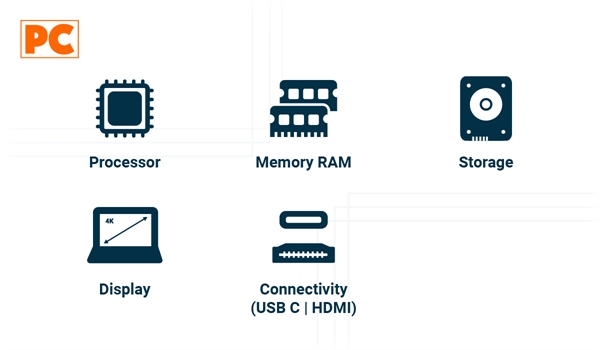
Processor (CPU):
The processor is one of the most important components of a laptop. Below is a quick guide on which processor is suitable based on use:
- Basic use: Intel Core i3 or AMD Ryzen 3 are sufficient for everyday tasks like web browsing, watching videos, and using office applications.
- Intermediate use: Intel Core i5 or Ryzen 5 are better for multitasking and some more demanding tasks, such as basic photo and video editing.
- Advanced use: Intel Core i7 or Ryzen 7 are designed for professionals who require high performance, such as graphic designers and gamers.
Memory RAM:
RAM is responsible for how many applications can run simultaneously without slowdowns. Here’s how much memory you need based on use:
- 4 GB: Sufficient for light tasks like browsing and word processing. However, it is considered a bit limited for new technologies.
- 8 GB: Ideal for most users, allowing multiple applications to run at the same time without issues.
- 16 GB or more: Recommended for professionals working with heavy software, such as video editing or gaming.
Storage:
This will be the capacity of the laptop. There are SSDs and HDDs, and the difference between them lies in speed and storage capacity.
- HDD (Hard Disk Drive): Slower but cheaper. Ideal if you need to store a large amount of files and do not mind the speed.
- SSD (Solid State Drive): Faster and more efficient. It makes the operating system and applications start much quicker. Recommended for most users.
Display:
The display is another key factor to consider, especially if you work with graphics or plan to watch multimedia content in high quality.
- Resolution: Most laptops have Full HD (1920x1080) screens. For everyday use, this is more than sufficient. However, for more detailed tasks like photo editing, a 4K screen may be necessary.
- Display technology: Laptops with OLED screens offer better colors and deeper blacks compared to traditional LED screens.
Connectivity:
Make sure your laptop has the ports you need. Some options to consider include:
- USB-C: Ideal for charging and quickly transferring data.
- HDMI: To connect your laptop to external displays.
- Bluetooth and Wi-Fi 6: Make sure your laptop supports the latest technologies for fast and stable wireless connectivity.
What Laptop Configuration is Best for You?
Choosing the right laptop configuration can be as crucial as choosing the actual laptop. The best laptop configuration for you depends on your specific needs. Consider not only your current use but also future needs, and if possible, opt for something that allows for growth. Remember, investing in a good laptop is an investment in your productivity and long-term satisfaction. We can divide these configurations into the following:
What laptop is best for General Use or Students?
This configuration offers a perfect balance between performance and price. Sufficient for browsing, word processing, presentations, and studying tasks without slowdowns.
- Processor: Intel Core i5 or AMD Ryzen 5.
- RAM: 8GB.
- Storage: 256GB SSD.
- Display: 14" Full HD.
- Battery: At least 8 hours.
- Operating System: Windows 10/11 or Chrome OS.
What laptop is best for Graphic Design and Video Editing professionals?
Performance is key here. You need powerful processing, a lot of RAM to handle heavy software, and a display that accurately represents colors. A dedicated graphics card speeds up rendering processes.
- Processor: Intel Core i7 or AMD Ryzen 7/9.
- RAM: 16GB or more.
- Storage: 512GB SSD or more, considering an additional HDD for storage.
- Display: 15.6" or more, with 4K resolution or a high color gamut (Adobe RGB). Consider also a touchscreen in case you need it.
- Graphics: Dedicated graphics card (NVIDIA GTX/RTX).
- Operating System: Windows 10/11 or macOS.
What laptop is best for Gamers?
Current games require powerful hardware. The refresh rate of the screen improves game fluidity, and cooling prevents overheating during intense gaming sessions.
- Processor: Intel Core i7 or AMD Ryzen 7/9.
- RAM: Minimum 16GB, 32GB if possible.
- Storage: NVMe SSD for games, additional HDD for storage.
- Display: 15.6" or more, with a high refresh rate (120Hz or more).
- Graphics: NVIDIA RTX 3060 or higher, or equivalent AMD Radeon.
- Cooling: Good cooling system for prolonged sessions.
- Operating System: System: Windows 10/11.
What laptop is best for Programmers and Developers?
RAM and fast storage are crucial for working with multiple development environments and handling large projects. The choice of operating system depends on the development ecosystem you work in.
- Processor: Intel Core i7 or AMD Ryzen 7.
- RAM: 16GB, preferably 32GB.
- Storage: 512GB SSD or more.
- Display: 13" to 15.6" Full HD, considering portability.
- Operating System: Windows, macOS, or Linux (depending on preference and type of development).
- Keyboard: Good backlighting and key layout.
What laptop is best for Business Users and Executives?
Portability, battery life, and security are key. This configuration allows efficient work on the go without sacrificing performance.
- Processor: Intel Core i5 or AMD Ryzen 5.
- RAM: 8GB or 16GB if you run many applications.
- Storage: 256GB SSD, considering expansion options up to 512GB or 1TB.
- Display: 13" to 14" Full HD, with good resolution and portability.
- Battery: More than 10 hours.
- Operating System: Windows 10/11 or macOS.
- Security: Consider security options like Touch ID or Windows Hello
What are the most popular Laptop brands?
To compare popular laptop brands, it's crucial to consider several factors like performance, design, durability, and value for money. Here’s an overview based on trends in the Latin American market:
- Apple: Offers perfect integration with the brand's ecosystem. It has high build quality and durability. Its M2 and M3 chips provide excellent performance and energy efficiency. Additionally, its macOS operating system is highly regarded for its stability and design. However, its prices tend to be higher than other options, and it has fewer hardware customization options. This brand is ideal for users in the Apple ecosystem, creatives, and those who value aesthetics and durability.
- Dell: Perfect for professionals who need power and versatility, especially in XPS models. They have a wide range of products from ultrabooks to workstations with great value for money, along with excellent technical support and service options. However, some models can be heavy or less portable, and quality can vary significantly between product lines.
- Lenovo: It is ideal for businesses and users looking for robustness and versatility. The ThinkPad series is synonymous with durability and excellent keyboards, making it highly valued in the corporate sector. Additionally, it provides good value for money with the Legion series for gaming, while the Yoga series offers versatility with its 2-in-1 design. However, one drawback to consider is that quality can vary between different lines, such as ThinkPad and IdeaPad. For more information on the products from this brand, check out our article on What Products Does Lenovo Sell in Latin America?
- HP: It offers a wide range of options with the Spectre and Envy series aimed at premium users, as well as a solid selection for gaming with the Omen series. The ProBook laptops are well-regarded in the business sector; however, some more economical models may have limitations in specifications. HP is an excellent choice for those seeking a blend of style and functionality, especially in its high-end range. To learn more about what HP offers in the region, visit our article on What Products Does HP Sell in Latin America?
- Asus: Offers good value for money in entry-level or low-end models. While their ZenBook and VivoBook models feature innovative design and good performance, build quality can vary greatly between lines, and they have less technical support compared to Dell or Lenovo. It’s a recommended brand for students and those looking for an entry-level laptop.
What are the most common Accessories for Laptops?
Laptop accessories can significantly enhance the user experience, whether for work, study, gaming, or simply keeping your device secure and functional. Choosing the right accessories for your laptop can improve its functionality and durability, as well as your comfort and efficiency while using it. Depending on your specific needs, from protection to capacity expansion, there are a variety of accessories that can perfectly complement your laptop. Here is a list of the most common and useful accessories if you are considering buying a laptop:
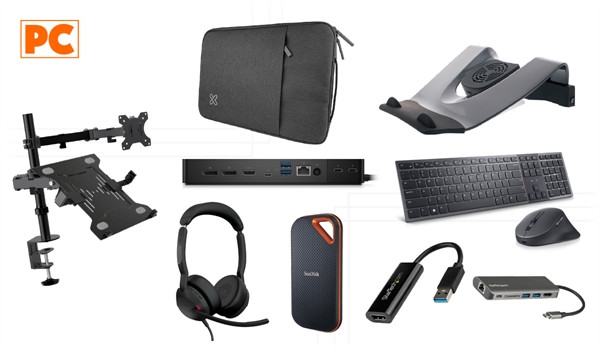
- Laptop Sleeves and Bags: Help protect your laptop from bumps, scratches, and dust. They come in various materials such as neoprene, synthetic leather, or fabric. Also ideal for carrying your laptop along with other accessories like chargers, tablets, or books.
- External Keyboards and Mice: Offer greater comfort and ergonomics, especially for long typing sessions. They also improve precision and comfort compared to the laptop's touchpad.
- Cooling Pads or Laptop Stands: A cooling pad reduces your laptop's temperature, which can improve performance and lifespan, especially useful for gaming or intensive tasks. They also elevate your laptop to an ergonomic height, often with ventilation for cooling.
- Docking Stations: Add multiple ports (USB, HDMI, Ethernet, etc.) for connecting peripherals without using the laptop's ports, ideal for users working on multiple devices.
- Headphones and Microphones: Improve audio experience, ideal for video conferences, gaming, or listening to music without distractions. They are also quite useful for enhancing audio quality in recordings or videoconferences.
- External Storage Devices: An external HDD or SSD expands storage and is ideal for backups or storing large files.
- Adapters and Connectors: USB-C adapters for connecting devices that do not have USB-C directly to your laptop, as well as HDMI, VGA, or DisplayPort cables for connecting your laptop to monitors or projectors.
Is it advisable to buy a refurbished or used laptop?
Buying a refurbished or used laptop can be an option to consider under certain circumstances, but it also comes with many risks and considerations. Here’s a guide to help you decide if it is advisable for you:
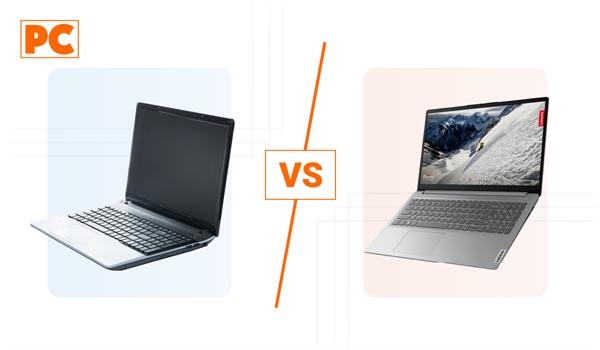
Advantages:
- Cost Savings: Generally, refurbished or used laptops cost significantly less than new ones, allowing you to access higher-end or more specifications that would otherwise be out of your budget.
- Sustainability: Buying refurbished is a more environmentally friendly practice as it reduces the need to produce new devices, which implies fewer natural resources and less electronic waste.
- Access to Discontinued Models: Sometimes, you can find older models or special editions that are no longer available in the new market.
- Warranty and Support: Many reputable stores offer warranties on their refurbished or used products, although these are often much shorter than those for new products
Disadvantages:
- Variable Condition: Although "refurbished" implies that the product has been checked and repaired, quality can vary. Some companies may present these products this way but may have signs of use or other minor defects not mentioned. Buying from reputable sellers is key if you consider this option.
- Limited Warranty: Warranties are usually shorter or less extensive than those of new products. Make sure to read the warranty conditions. Even if the warranty is limited, it is better than nothing.
- Compatibility and Updates: Older laptops may not support the latest operating system or software updates, which could limit their long-term functionality. Ensure that the technical specifications remain adequate for your needs. Don't just get carried away by the price.
- Uncertain Durability: Although they have been checked, the lifespan of a refurbished or used laptop may be less than that of a new one, especially if it has already been used intensively. If possible, test the laptop before buying it or ensure there is a clear return policy
- Battery Life: While a used laptop may offer many benefits, battery life is not one of them. Laptops are designed to last a few years, meaning that you will soon need a battery replacement, and these can be hard to find or, in some cases, expensive.
Buying a refurbished or used laptop can be a smart decision if you're looking to save money and don't need the latest technology. However, it is crucial to do research, buy from reliable sources, and be aware of potential limitations. If you can accept these risks and ensure you get a warranty, a refurbished laptop can offer excellent value for money.
Where can you buy Laptops in Latin America?
To buy laptops in Latin America, you have several options ranging from physical stores to online platforms, each with its own advantages in terms of price, warranty, and availability. Buying directly from Apple Store, Dell, Lenovo, or ASUS in their official stores or websites can provide more robust warranties and access to exclusive or cutting-edge products. However, often these products are not available for same-day delivery, and in some cases, personal importing of laptops from the United States or Europe can result in significant savings, especially if price differences are leveraged and logistics are managed well. However, you should consider all the taxes you have to pay because you might end up paying more than the price of a local store.
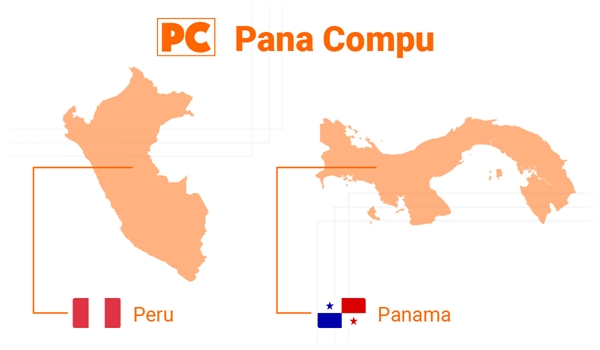
Where can you buy Laptops in Peru?
In Peru, you can buy laptops in a variety of places, both in physical stores and online platforms. Although the presence of platforms like Amazon in Peru is more limited, some stores may use Amazon to sell, sometimes offering imports or exclusive products. However, this can lead to long wait times for equipment. Buying from official sellers or stores with a good reputation, such as Pana Compu, ensures that the products come with 100% valid warranty in the country. Laptops in Peru can also be found in department stores, which may offer competition that benefits consumers with varied options and competitive prices. However, physical stores often have a lower quantity of offerings compared to online stores.
Where can you buy Laptops in Panama?
The choice of where to buy a laptop in Panama will depend on your preferences for brands, budget, need for financing, and the importance of warranty and after-sales support. It is always advisable to compare prices, read reviews, and consider the reputation of the seller or store before making a decision. You can buy laptops in Panama at stores like Pana Compu, where you can find a variety of laptops with quick delivery options and sometimes exclusive promotions.
In summary: What Should You Know Before Buying a Laptop?
Before buying a laptop, it’s crucial to consider several factors to ensure your purchase is the most suitable for your needs. Define the Primary Use: work, study, gaming, graphic design, or video editing. Define the technical specifications, the operating system. Look for the laptop in stores with good warranty policies and simple purchasing processes like Pana Compu. Set a budget and look for the best value for money within that range. Not always is the most expensive the best for your needs. Think about how your needs may change in the coming years.
Buying a laptop is an investment, so take your time to research and consider all these variables. A good laptop should not only meet your current needs but also have the capacity to adapt to future changes in your usage requirements.
Comments
All opinions are of our customers friends. Join the conversation!
No comments yet... Be the first!